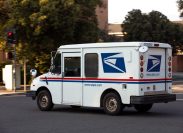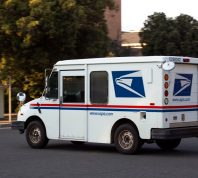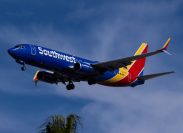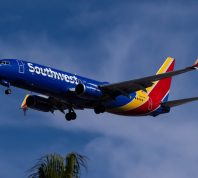6 Things You Should Never Eat or Drink on a Plane If You're Over 60
Don't make these common mid-air mistakes, nutritionists say.
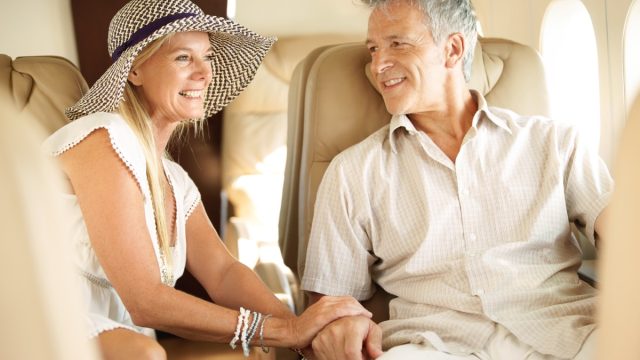
Plane travel can be hard on your body at any age—especially when you're traveling long distances. However, people over the age of 60 are likely to be more sensitive to the effects of flying, research shows. Not only are older adults more susceptible to jet lag, but they are also more likely to experience gastrointestinal problems, sleep disturbances, problems with blood sugar, and spikes in blood pressure—all of which can be exacerbated by travel. In particular, what you eat or drink on a flight can contribute to how you fare while flying.
Megan Lyons, a certified clinical nutritionist, board-certified holistic nutritionist, and the founder of The Lyons' Share Wellness, says that there are many ways that your in-flight food and beverage choices can cause health consequences.
"The high-pressure cabin can be challenging for your digestive system. So, for very short flights—a couple of hours or less—I recommend not eating anything during the flight and giving your system a chance to rest. It's perfectly fine to pass up on the snack. If you've already had a good meal before the flight, you can wait until you reach your destination to eat again, and that will help your digestive system," she tells Best Life.
However, for longer flights, you're going to need to eat—which is why it pays to know which foods may put you at risk of a problem. Read on to learn which six things you should never eat or drink on a plane, for happier travels and a safe arrival at your final destination.
RELATED: 7 Clothing Items to Never Wear Through Airport Security, Experts Say.
1
Alcohol
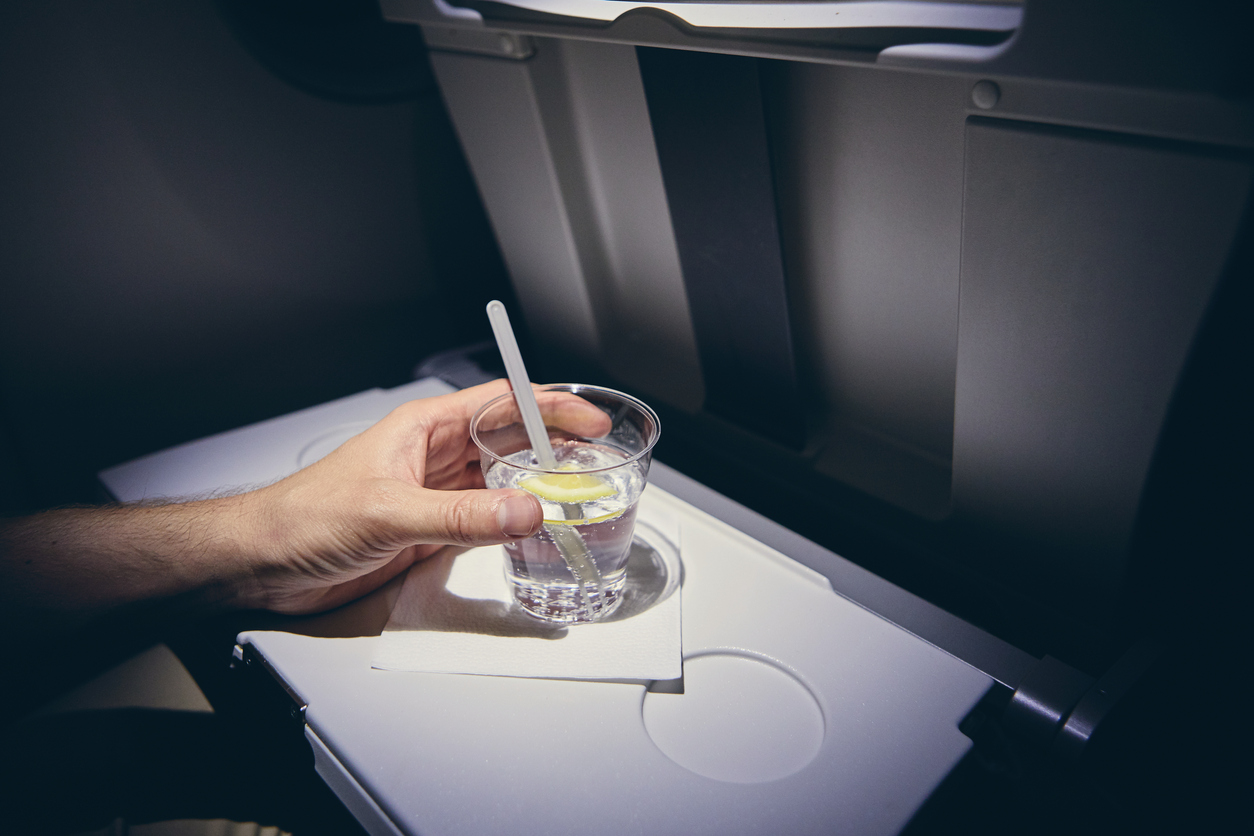
According to Lyons, the conditions of air travel can greatly alter how you respond to a wide range of food and beverages, especially if you're over 60.
"The cabin pressure is high, and the air humidity is very low—even drier than the Sahara Desert, according to some research. Being in such a low-humidity, high-pressure environment is tough on your body," she explains.
That's why, while you may enjoy a consequence-free drink on a normal night on land, she says that alcohol is more likely to cause dehydration, gastrointestinal issues, or a hangover on a flight.
"I know those tempting drinks offered by flight attendants might sound tasty, but they can dehydrate you. If anyone has experienced constipation or swollen hands after flying, it's likely due to dehydration from the flight. My main advice would be to drink a ton of water before, during, and after the flight. This really helps to keep digestion regular and avoid feeling bloated during the trip or after landing," she says.
READ THIS NEXT: 5 Surprising Items TSA May Flag You for at Airport Security.
2
Pretzels, peanuts, and other salty foods
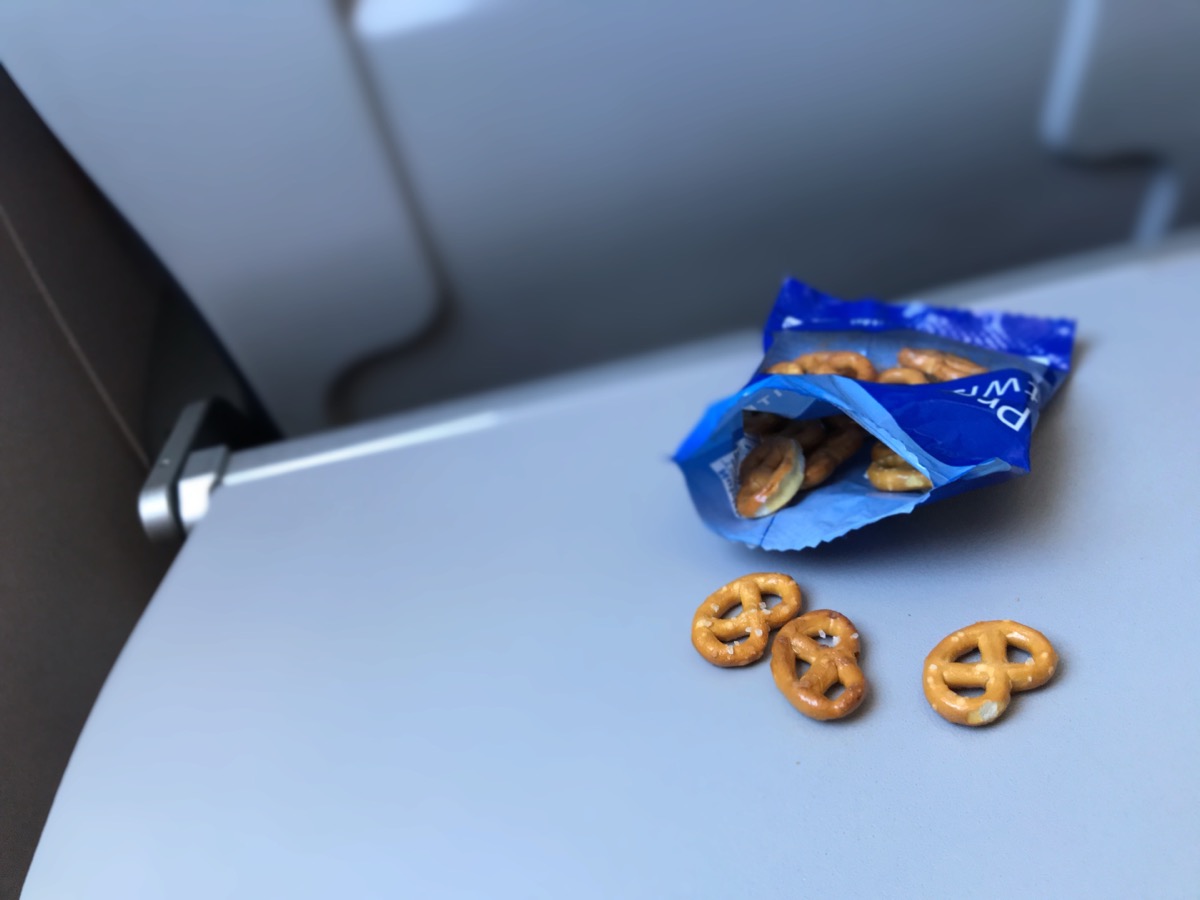
Any time you take a long-haul flight, you may experience some swelling in the legs and ankles. Podiatry group Optima Foot and Ankle explains that there are two key reasons: prolonged inactivity and the powerful force of gravity pulling the fluids in your legs down toward the earth.
Besides being uncomfortable, this can pose a serious risk to long-distance travelers, making them more likely to develop blood clots in the deep veins of their legs in a condition known as Deep Vein Thrombosis (DVT). While people of all ages can develop blood clots, seniors are at the highest risk and should avoid all possible triggers for the condition.
Caroline Thomason, RD, CDCES, a dietitian based in the Washington, D.C. area, says that eating too many salty foods like pretzels and peanuts is one such trigger that can increase your risk of swelling in the lower extremities. On top of this, she says high-sodium snacks can lead to dehydration when you're already more likely to be dehydrated from travel.
RELATED: Over 65? Don't Forget to Do This After Boarding, Flight Attendant Warns.
3
Diet soda
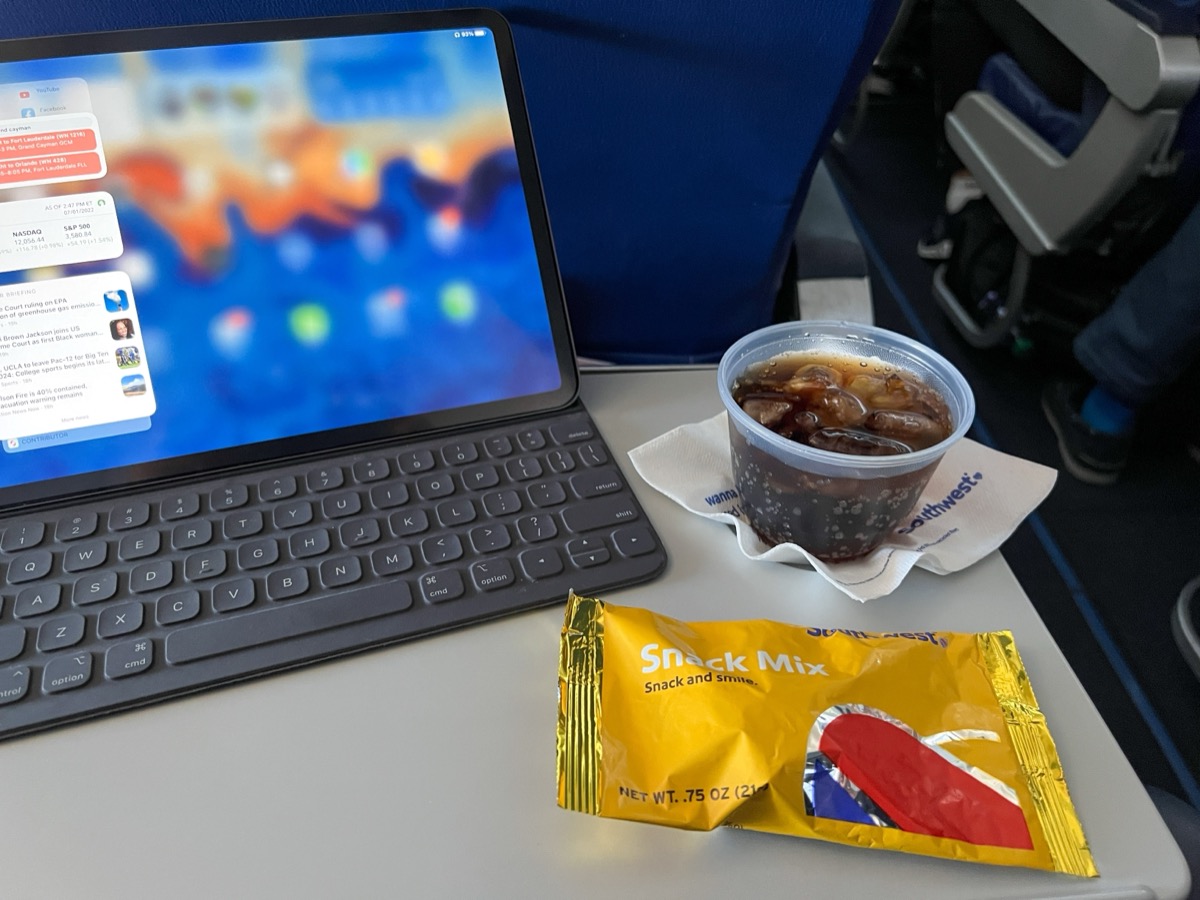
Many people feel bloated and uncomfortable while flying on a plane, especially when they already struggle with gastrointestinal problems such as Irritable Bowel Syndrome (IBS). Low-calorie sweeteners found in diet soda can take this problem from bad to worse, warns the AARP.
"Manufacturers use low-calorie sweeteners like sorbitol in foods and beverages to bring down the overall calorie count. But some sweeteners might not digest fully in the small intestine, leading to gas and bloating in the large intestine," their experts write.
Compounding the problem, carbonation can also irritate your digestive tract while in the air. Lyons says it's best to stick to water until you reach your final destination.
4
Raw vegetables
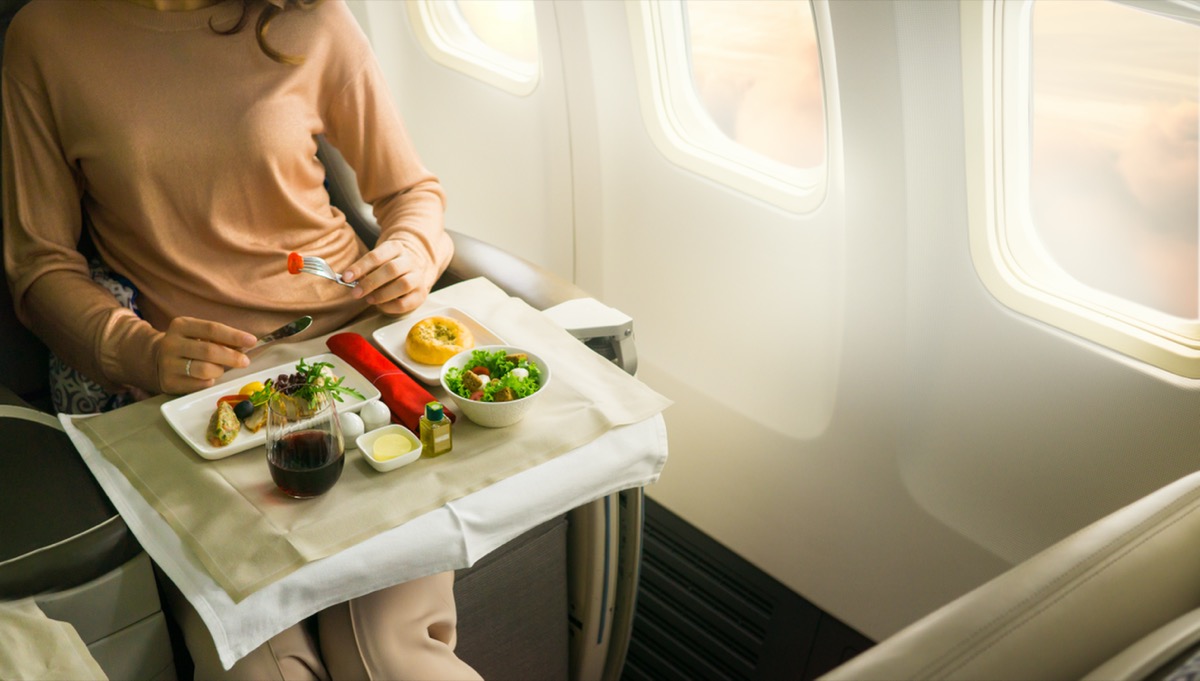
Packing your own healthy, low-sodium snacks from home can be a great way to sidestep the effects of plane food while traveling. However, Lyons says that raw veggies—usually a great snack option down here on Earth—can wreak havoc on your digestive tract on a plane.
"This is probably the only time when I would suggest avoiding a bunch of raw vegetables," Lyons tells Best Life. "They require a lot of digestive capacity and can cause bloating and other issues in a high-pressure cabin."
For more travel tips sent directly to your inbox, sign up for our daily newsletter.
5
Juice
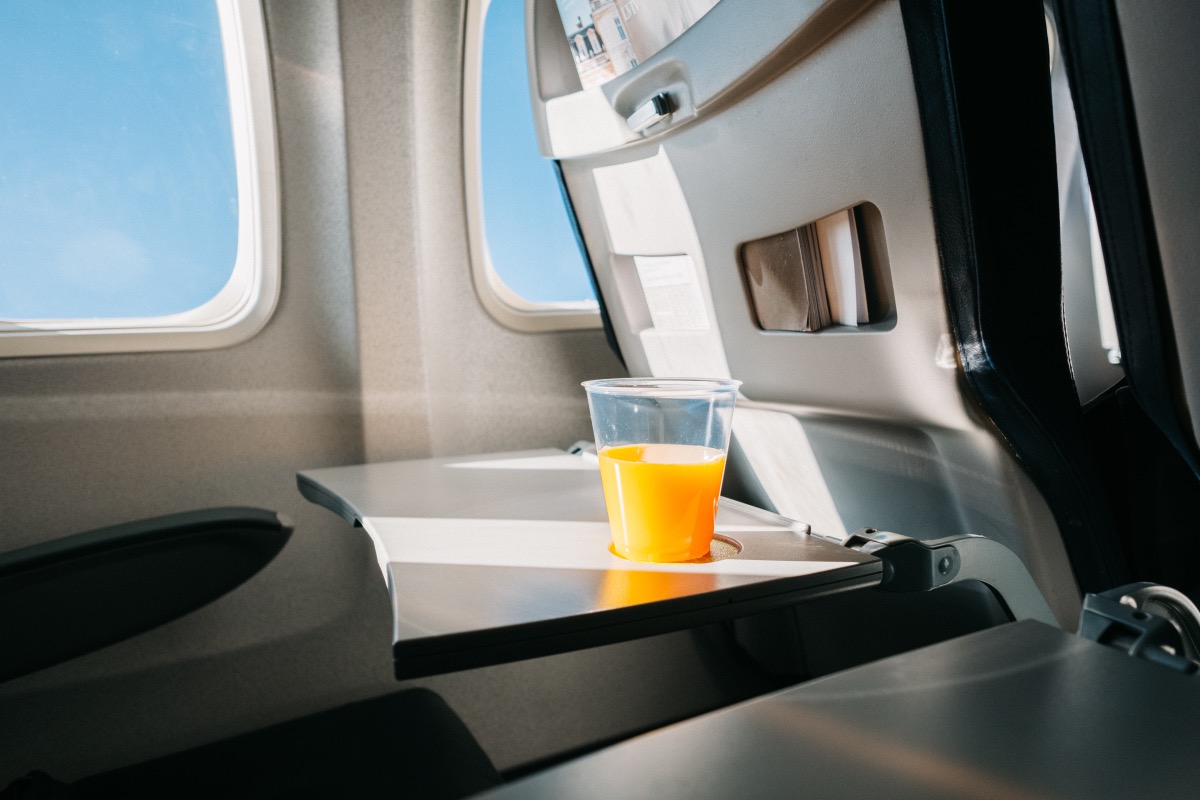
Anyone with a blood sugar imbalance should exercise additional precautions while on a plane. However, according to the Centers for Disease Control and Prevention (CDC), 80 percent of people with pre-diabetes and 20 percent of people with diabetes don't know they have it. This can lead to disaster in the air.
Thomason recommends that people over 60 should take care to limit sugary snacks and beverages, including fruit juice. "For older folks with blood sugar concerns, juice is not the best choice as it is high in sugar and the fiber is removed, thus making blood glucose rise quickly."
6
Coffee and tea
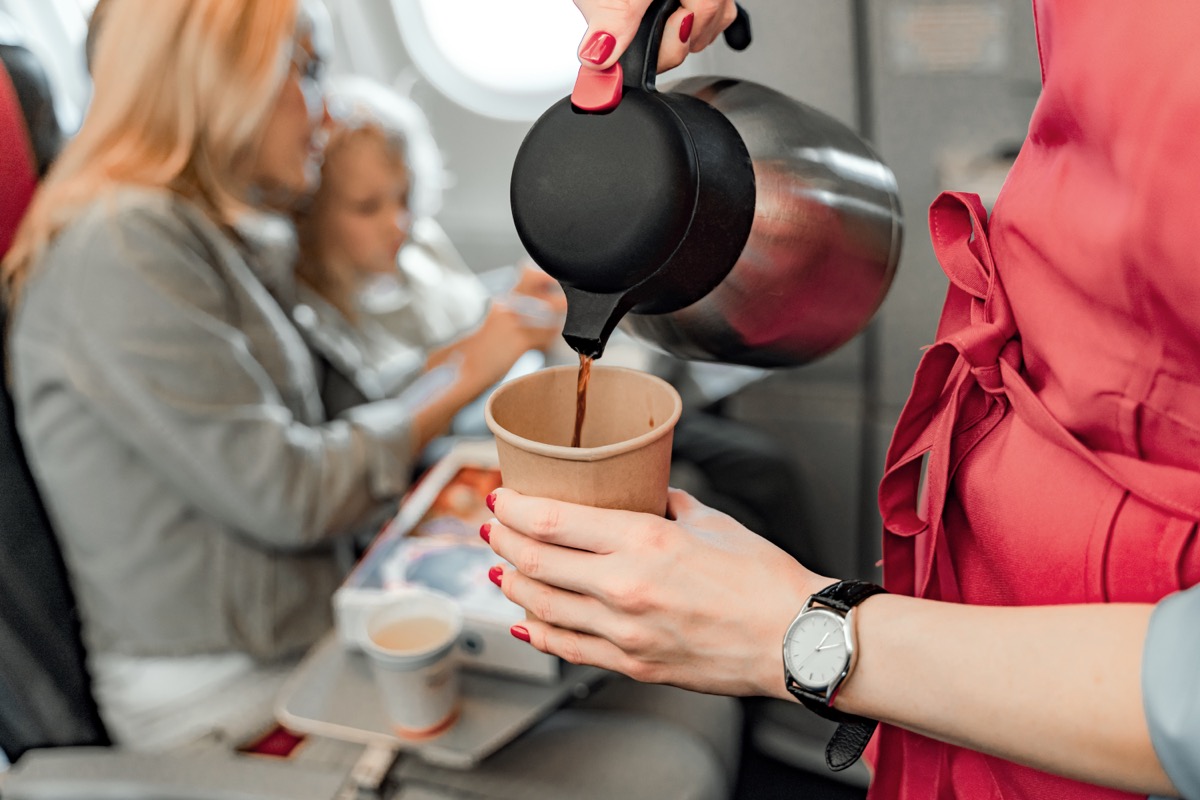
After waking up from a restless sleep on a long plane ride, you may feel like coffee or tea is just what the doctor ordered. Yet a 2019 study on airline water quality conducted by the Hunter College NYC Food Policy Center at the City University of New York found that many airlines serve unclean water in beverages while in the air.
In fact, after reviewing the quality of drinking water on 11 major international airlines and 12 regional airlines, the researchers determined that seven international airlines and nearly all of the regional airlines had poor water quality. Since seniors are more prone to food-borne illness than younger adults, this can leave them especially vulnerable to food poisoning on or after a flight.














